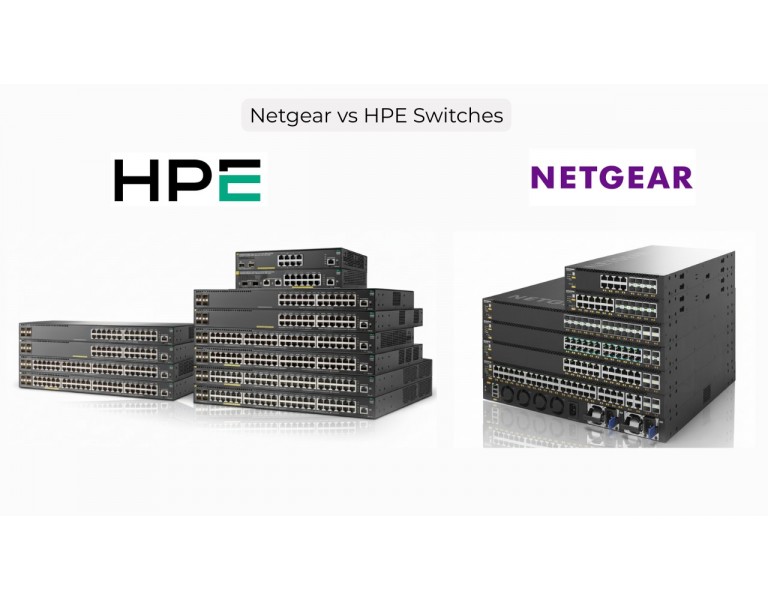No products
Netgear vs HPE switches performance, cost, and reliability comparison for real-world enterprise use
Blog Categories
Archives
Latest Posts

Every business network eventually hits the same fork in the road. do you go with Netgear or HPE for your switching backbone? Both brands have earned respect in enterprise networking, but their gear serves slightly different kinds of users. Choosing the wrong one can lead to wasted budget, missed performance targets, and unnecessary complexity. Let’s break it down from a real engineer’s point of view, based on deployment experience, not marketing slides.
If you’re managing a mid-size enterprise, campus, or AV-over-IP deployment, Netgear delivers a lot of value without over-engineering. Models like the M4300 or M4500 series give you 10G to 100G throughput, stackable architecture, and solid Layer-3 features at a fraction of what big brands usually charge.
Why Netgear works:
Plug-and-play stack setup for quick scaling
Easy GUI or CLI management through Netgear NMS300
Silent or near-silent cooling ideal for office or AV spaces
Great PoE+ and PoE++ coverage for IP cameras and access points
It’s the right choice when you need reliability and simplicity. You don’t want to spend a week configuring VLAN trunks just to get your wireless and servers online.
HPE’s Aruba and FlexNetwork lines are built for larger, heavily segmented enterprise networks where central policy control, user authentication, and analytics are critical. They shine in environments with hundreds of access switches feeding into a redundant core, such as universities or healthcare systems.
Why HPE stands out:
Deep integration with Aruba Central for cloud management
Full Layer-3+ routing with advanced security policies
Multi-chassis link aggregation for high-availability cores
Longer lifecycle support and firmware stability
If your environment runs multiple VLANs, security overlays, or complex QoS policies, HPE handles that better out of the box. But you’ll pay more for licensing and maintenance.
| Criteria | Netgear Switches | HPE Switches |
|---|---|---|
| Price Range | Lower initial cost, no mandatory licenses | Higher cost, includes enterprise features |
| Ease of Setup | Simple and fast | Requires deeper configuration |
| Performance | Excellent for 10G/25G/100G edge and AV use | Strong for multi-tenant enterprise cores |
| Support & Warranty | Lifetime hardware warranty | Extended warranty via Care Packs |
| Management | Web GUI, CLI, NMS300 | Aruba Central, IMC, CLI, SNMP |
| Best Use Case | SMB to mid-enterprise, AV, campus | Large enterprise, data center, universities |
Netgear wins on cost-to-performance ratio. You get enterprise-grade switching power at SMB-friendly pricing. Its reliability record has improved significantly over the past decade, especially in the M4300 and M4500 ranges.
HPE, on the other hand, emphasizes uptime and long-term support. Firmware releases are stable, hardware redundancy is built-in, and their global support network is unmatched — but the price reflects it.
Netgear Pros:
Lower TCO (Total Cost of Ownership)
Simple learning curve
Excellent performance in AV-over-IP or branch networks
Lifetime warranty on hardware
Netgear Cons:
Fewer SDN and analytics options
Limited third-party integration
HPE Pros:
Rich security and automation ecosystem
Strong cloud-based monitoring (Aruba Central)
Proven stability in large-scale deployments
HPE Cons:
High upfront and license costs
Complex management for small teams
Small to Mid-Size Businesses: Go with Netgear M4300 series — you’ll get the most performance per dollar and simple management.
AV Integrators and Media Studios: Use Netgear M4500 series, built for multicast and 100G streaming.
Large Enterprises and Campuses: Choose HPE Aruba 6300/6400 lines for scalability, redundancy, and advanced policy control.
Data Centers: HPE’s higher-end FlexNetwork series suits virtualized workloads and automation environments.
Both brands build excellent switches, but the right choice depends on how deep your network stack goes.
If you value ease, cost-efficiency, and solid 10G/25G performance, Netgear is the smarter choice.
If your network needs multi-layer policy control, advanced routing, and centralized visibility, HPE justifies its cost.
The real trick is aligning the switch with your team’s skills, uptime expectations, and growth plan — not just the logo on the front panel.
Comments (0)
No comment